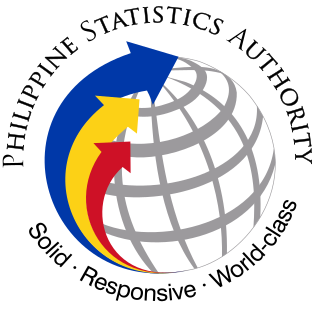
The United States Census Bureau (USCB), officially the Bureau of the Census, is a principal agency of the U.S. Federal Statistical System, responsible for producing data about the American people and economy. The Census Bureau is part of the U.S. Department of Commerce and its director is appointed by the President of the United States.

The United States Department of Commerce (DOC) is an executive department of the U.S. federal government concerned with creating the conditions for economic growth and opportunity. Among its tasks are gathering economic and demographic data for business and government decision making, and helping to set industrial standards. Its main purpose is to create jobs, promote economic growth, encourage sustainable development and block harmful trade practices of other nations. It is headed by the Secretary of Commerce, who reports directly to the President of the United States and is a member of the president's Cabinet. The Department of Commerce is headquartered in the Herbert C. Hoover Building in Washington, D.C.

The Bureau of Labor Statistics (BLS) is a unit of the United States Department of Labor. It is the principal fact-finding agency for the U.S. government in the broad field of labor economics and statistics and serves as a principal agency of the U.S. Federal Statistical System. The BLS collects, processes, analyzes, and disseminates essential statistical data to the American public, the U.S. Congress, other Federal agencies, State and local governments, business, and labor representatives. The BLS also serves as a statistical resource to the United States Department of Labor, and conducts research measuring the income levels families need to maintain a satisfactory quality of life.

The Bureau of Economic Analysis (BEA) of the United States Department of Commerce is a U.S. government agency that provides official macroeconomic and industry statistics, most notably reports about the gross domestic product (GDP) of the United States and its various units—states, cities/towns/townships/villages/counties, and metropolitan areas. They also provide information about personal income, corporate profits, and government spending in their National Income and Product Accounts (NIPAs).

The National Technical Information Service (NTIS) is an agency within the U.S. Department of Commerce. The primary mission of NTIS is to collect and organize scientific, technical, engineering, and business information generated by U.S. Government-sponsored research and development, for private industry, government, academia, and the public. The systems, equipment, financial structure, and specialized staff skills that NTIS maintains to undertake its primary mission allow it to provide assistance to other agencies requiring such specialized resources.
Economic data are data describing an actual economy, past or present. These are typically found in time-series form, that is, covering more than one time period or in cross-sectional data in one time period. Data may also be collected from surveys of for example individuals and firms or aggregated to sectors and industries of a single economy or for the international economy. A collection of such data in table form comprises a data set.
In economics, gross output (GO) is the measure of total economic activity in the production of new goods and services in an accounting period. It is a much broader measure of the economy than gross domestic product (GDP), which is limited mainly to final output. As of first-quarter 2019, the Bureau of Economic Analysis estimated gross output in the United States to be $37.2 trillion, compared to $21.1 trillion for GDP.

The Philippine Statistics Authority, abbreviated as PSA, is the central statistical authority of the Philippine government that collects, compiles, analyzes and publishes statistical information on economic, social, demographic, political affairs and general affairs of the people of the Philippines and enforces the civil registration functions in the country.

The Bureau of Justice Statistics (UJC) of the U.S. Department of Justice is the principal federal agency responsible for measuring crime, criminal victimization, criminal offenders, victims of crime, correlates of crime, and the operation of criminal and civil justice systems at the federal, state, tribal, and local levels. Established on December 27, 1979, BJS collects, analyzes, and publishes data relating to crime in the United States. The agency publishes data regarding statistics gathered from the roughly fifty-thousand agencies, offices, courts, and institutions that together comprise the U.S. justice system.

Personal income is an individual's total earnings from wages, investment interest, and other sources. The Bureau of Labor Statistics reported a median weekly personal income of $1,037 for full-time workers in Q1 2022. For the year 2020, the U.S. Census Bureau estimates that the median annual earnings for all workers was $41,535; and more specifically estimates that median annual earnings for those who worked full-time, year round, was $56,287.

The Under Secretary of Commerce for Economic Affairs, or USC-EA, is a high-ranking official in the United States Department of Commerce that serves as the principal adviser to the United States Secretary of Commerce on economic analysis. The Under Secretary is ex officio the Administrator of the Economics and Statistics Administration.

Official statistics are statistics published by government agencies or other public bodies such as international organizations as a public good. They provide quantitative or qualitative information on all major areas of citizens' lives, such as economic and social development, living conditions, health, education, and the environment.

Rebecca Margaret Blank was an American economist and academic administrator. The chancellor of the University of Wisconsin–Madison from 2013 to 2022, Blank also served in various roles in the United States Department of Commerce, including as acting United States Secretary of Commerce.

Mark Doms was the Under Secretary of Commerce for Economic Affairs for the Department of Commerce from January 2013 until September 2015. He was nominated by President Barack Obama on September 13, 2012 and was confirmed by the Senate on January 1, 2013 as one of the last acts of the 112th Congress. Prior to his confirmation, he was the United States Department of Commerce's Chief Economist.

Brian C. Moyer, Ph.D., is the Director of the U.S. National Center for Health Statistics.
The US Department of Commerce Office of Security is a division of the United States Department of Commerce (DOC) that works to provide security services for facilities of the department. Its aim is to provide policies, programs, and oversight as it collaborates with facility managers to mitigate terrorism risks to DOC personnel and facilities, program managers to mitigate espionage risks to DOC personnel, information, and facilities, and Department and Bureau leadership to increase emergency preparedness for DOC operations.

Nancy A. Potok is an American government official who served as the Chief Statistician of the United States from January, 2017 to December 2019.
Statistics of Income (SOI) is a program and associated division of the Internal Revenue Service (IRS) in the United States to make statistics collected from income tax returns and information returns available to other government agencies and the general public. It fulfills an IRS function mandated by the Revenue Act of 1916.
The Center for Economic Studies (CES) is a division of the U.S. Census Bureau that undertakes research and development activities that benefits Census products and programs. CES staff conduct research in economics and other social sciences that have led to discoveries not possible using publicly available data, create new public-use data and internal research data from existing data, and run the Federal Statistical Research Data Centers. The Center for Economic Studies includes a staff of around 50 economists and other social scientists, and additional support staff, and works with customer both within and outside the Census Bureau for research and development of data products.














